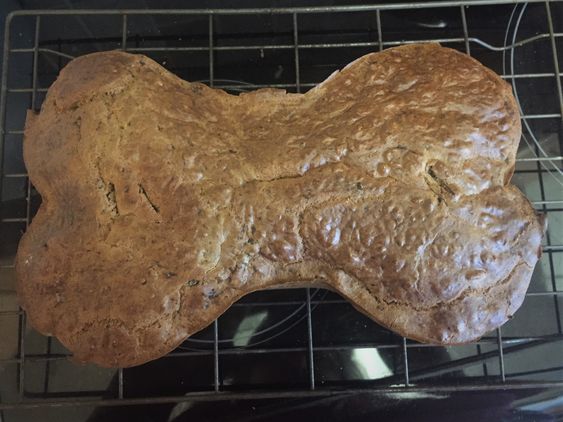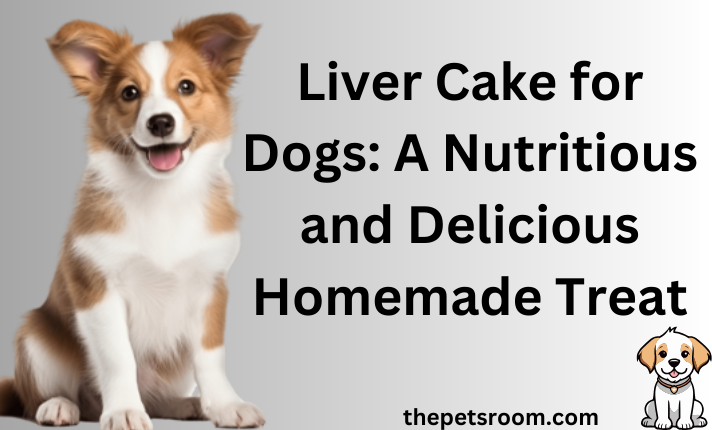Dog owners like making liver cake for dogs, a beloved homemade treat, for their canine companions. This cake, which is largely made of liver, is high in important nutrients and makes a tasty and nutritious dog treat. It’s an excellent alternative to store-bought dog treats, which are sometimes filled with artificial tastes and preservatives. Instead, it offers a healthy, natural alternative that dogs will like.
Liver is a good ingredient for dog treats due to its nutritional value. The liver’s high protein content helps dogs of all ages strengthen and repair their muscles. It also contains essential minerals including iron, zinc, and copper, as well as vitamins A, B, and especially B12. These nutrients support a dog’s health in many ways, including as greater eyesight, healthier skin and hair, and a more robust immune system. Because of liver’s robust taste, liver cake is very tasty and will soon become one of your dog’s favorite treats.
Ingredients for liver cake
Principal Component
Naturally, the liver is the star of the show in liver cake. You may choose lamb, beef, or chicken liver based on your dog’s preferences and what’s available. Beef liver has a stronger taste and is richer than chicken liver, which is often the least expensive and mildest. If your dog is allergic to more common proteins, lamb liver is a fantastic alternative since it has a distinct flavor.

Other Essential Ingredients
In addition to liver, you’ll need a few basic ingredients to create the cake’s structure and texture:
- Eggs: These act as a binding agent, helping the cake hold together while also adding additional protein.
- Whole meal Flour: A healthier alternative to white flour, whole meal flour provides fiber and a denser texture that’s perfect for baking.
- Oats: Rolled oats are a great source of fiber and can help add a bit of chewiness to the cake.
- Vegetables: Adding vegetables like carrots or sweet potatoes not only boosts the nutritional value but also adds moisture and sweetness to the cake.
Step-by-Step Recipe
Preparation
Choosing and Preparing the Liver: Start by selecting fresh liver. Rinse it under cold water to remove any blood, then pat it dry with paper towels. If the liver has any membranes or connective tissue, trim these off. Depending on the size of your food processor, you might need to cut the liver into smaller chunks.
Gathering Other Ingredients: Measure out your whole meal flour, oats, and any vegetables you plan to include. If using vegetables like carrots, grate them finely. Crack the eggs into a bowl and beat them
Mixing:
- Blending Liver Then, place the mashed liver in blender or food processor. Blend until the liver becomes smooth and looks like the consistency of a paste.
- Blending Ingredients In a large mixing bowl mix the liver paste with eggs that have been beat whole meal flour, oatmeal and the vegetables. Mix until the ingredients are evenly all over. If the mixture appears too thick, make a small addition of broth or water until you reach your desired thickness.

Baking Instructions:
- The process of preheating your Oven Preheat your oven to 350 degrees F (175degC). Grease a baking pan and line the tin with parchment to avoid sticking.
- Bake the cake Then, pour the mixture of liver into the baking tin that you have prepared and spread it equally. Place the baking tin in the oven to bake for 30-40 minutes up to the point that it is firm point of contact and a toothpick stuck into the middle is clean. The cake should be slightly springy feel when it is done.
Cooling and Storing:
- How to cool the cake When the cake is cooked take it out of the oven and let it cool completely inside the cake tin. This cooling process is vital because it allows the cake to get firmer and makes it easier to cut.
- Storage of the Cake After cooling the cake, cut it into strips or small squares. They can be kept in an airtight container within fridge for up to one week. To store them for longer it is possible to make slices and freeze them. You can simply thaw them whenever you need or give your dog an ice-cold piece during a hot day as refreshing treats.
Nutritional Value of Liver Cake for Dogs
The liver cake isn’t just an enjoyable treat, but it is also a very nutritious one that is packed with vital nutrients that aid in the overall health of a dog. Here’s a look at the important nutrients in liver cakes and how they will benefit your dog’s health.
1. Protein
Source: Liver, eggs
Benefits Protein is vital to build and repair tissues, assisting in the development of muscles and ensuring the health of your immune system. Protein also plays an essential part in the creation of hormones and enzymes.
2. Vitamins
Vitamin A:
Source: Liver
Benefits Vitamin A is essential to maintain good vision as well as supporting immunity, as well as promoting healthy coat and skin.
B Vitamins (B2, B3, B5, B6, B12):
Source Eggs, liver Whole meal flour
Benefits Vitamins HTML0 are essential to metabolism of energy and red blood cell development and ensuring healthy nervous system and skin functioning.
Vitamin D:
Source: Eggs
The benefits: Vitamin D helps regulate the balance of calcium and phosphorus essential to warrant bone health.
Vitamin E:
Source Whole meal flour, Oats
The benefits: Vitamin E acts as an antioxidant, defending cells from damage, and also enhancing the immune system.
3. Minerals
Iron:
Source: Liver
Benefits Iron is required to make hemoglobin. It is the substance that carries oxygen throughout the blood. It prevents anemia and boosts overall health.
Zinc:
Source Whole meal flour, Liver
The benefits: Zinc supports the immune system, helps in wound healing and is essential for good skin and coat health.
Copper:
Source: Liver
Benefits Copper is involved in the absorption of iron, the development of connective tissue as well as the functioning of the nervous system.
Magnesium:
Source Whole meal flour, Oats
Benefits Magnesium is necessary in nerve and muscle functioning, energy production and keeping the health of your heart.
4. Healthy Fats
Source Eggs, liver, optional peanut butter
Benefits Fats give an intense energy source and are vital to absorb fat-soluble vitamins (A D, E and and K). They also help maintain healthy coat and skin, and when used in moderation, may benefit the overall health of a dog.
5. Fiber
Source Whole meal flour Oats and vegetables
Benefits: Fiber assists in digestion, aids in maintaining an ideal weight, by encouraging feelings of fullness and may help aid in preventing constipation.
6. Antioxidants
Source Liver, optional ingredients like turmeric and parsley
Benefits Antioxidants benefit to protect cells in the body from the damage from free radicals. They also benefit reduce inflammation and improving overall health.

Portion Control and Balance
Although liver cake is extremely nutritious, it is important to keep in mind that it should be served as a treat, not as a replacement for a meal. It’s a great source of vitamin A, and can be harmful when consumed in large quantities, therefore moderation is essential. A small amount of liver cake could help in providing a substantial boost in nutritional value however, overfeeding can result in an imbalance of the diet of your dog.
Pros
1. Nutrient-Dense Treat
- High in Protein Liver cake is loaded with high-quality protein that is essential for the development of muscles and overall well-being.
- Vitamins and Minerals It’s a fantastic source of vital vitamins such as B12, A and D and minerals such as zinc, iron and copper that aid in boosting the dog’s energy and immunity.
2. High Palatability
- Dogs love the taste The strong taste from liver is what makes the cake attractive to dogs of all breeds which makes it a great opportunity as a reward for training or treats that are special to you.
3. Homemade and Customizable
- Control over Ingredients If you prepare liver cake at your home, you can warrant that it is free of artificial preservatives, colors and flavors. You can also personalize the recipe with extra ingredients that will meet the dog’s diet and preferences.
- Recipe Adaptable The recipe can be adjusted to the recipe to meet any dietary restrictions or allergies which makes the recipe appropriate for dogs with particular health issues.
4. Supports Training
- High-Value Rewards Thanks to its appealing flavor it is possible to have liver cake served as a reward of high value during training sessions, thereby helping to in promoting positive behaviour.
Cons
1. High in Vitamin A
- The risk of hypervitaminosis Liver is extremely high in vitamin A which, when consumed in large quantities can cause toxicities (hypervitaminosis A). Signs of this include joint pain, bone defects and digestive problems. Thus, liver cakes should be consumed in moderate amounts.
2. Calorie-Dense
- Potential for weight gain Liver cakes can be high in calories, particularly when it is made with additional ingredients such as peanut butter. Insufficient feeding can contribute to weight gain especially for dogs that are less active.
3. Potential Allergens
- Allergy Reactions Some dogs might be allergic to common ingredients such as eggs and wheat (in whole meal flour) or specific types of liver. It’s crucial to check your dog for indications that indicate an allergy like swelling, itching or stomach discomfort.

4. Requires groundwork and Cooking
- Time-consuming unlike store-bought snacks liver cakes require the preparation of food and cook time. It might not be suitable for dog owners who have busy schedules.
- A Short Shelf Time Because it’s made from scratch and without preservatives, the liver cake is less likely to have a shelf time than other commercially produced treats, and requires the right storage conditions and prompt consumption.
5. Strong Smell
- Pungent scent Liver is strong odors that people might not like when baking and preparing. The smell could be lingering within your kitchen.
FAQS
Is Too Much Liver Cake Bad for Dogs?
Yes, eating too many liver cakes can cause harm for dogs. It is very rich in vitamin A. Excessive consumption could result in vitamin A toxicity, which is called hypervitaminosis A. Signs of toxicity from vitamin A include joint deformities, bone stiffness, joint pain digestion issues, and in more severe cases, it could lead to more serious health issues. Due to this, liver cake is perfect served in moderation, and as an occasional treat, not an everyday part of the dog’s diet.
Do You Boil or Bake Liver for Dogs?
It is possible to prepare the liver of dogs either by boiling it in it or roasting, based on the texture you’d like to complete:
- Boiling Boiling the liver is an easy and fast method. It helps keep the liver soft and damp, which is great for those who plan serving it up as a tasty snack or add it to your dog’s diet. To boil your liver, put it in a pot of water that you bring to a boil, then simmer for approximately 15 minutes until it is cooked.
- Baking Baking your liver outcome in a more firm texture, which is perfect to bake treats like liver cakes or crispy liver chips. To bake the liver, heat your oven to 350 degF (175degC) and place the liver in a baking pan and bake for 20-30 minutes, based on the thickness of the liver, until it is fully cooked.
Is Baked Liver Good for Dogs?
Yes, cooked liver is a good choice for dogs when consumed in moderate amounts. Baking is a good method of cooking liver since it preserves the majority of nutrients, while also providing an extremely firm texture that can be incorporated into desserts like liver cake or even as a treat on its own. The baked liver is rich in proteins as well as vitamin A and B12, (especially vitamins A as well as B12) and minerals, including zinc and iron that can be beneficial to the health of your dog. Due its high vitamin A content it’s crucial not to eat too much cooked liver to avoid toxicity.
Are Liver Treats Safe for Dogs?
Liver treats are suitable for dogs so provided they are consumed in moderate amounts. Liver is loaded with vital nutrients, which makes it a very beneficial food. Due to the high Vitamin A content it is important to avoid feeding liver treats often or in large amounts. Consuming too much can result in toxic levels of vitamin A, so it’s excellent to limit the consumption of liver treats to a tiny portion of your dog’s diet. Make sure you monitor your dog’s overall health and speak with your vet in case you are concerned about including liver treats in your dog’s diet.
Conclusion
In conclusion, the liver cake is an extremely delicious and nutritious snack that has numerous health benefits to dogs, including vital minerals, vitamins, as well as proteins. However, due the high Vitamin A content it must be eaten in moderation to prevent health risks such as hypervitaminosis. If you carefully prepare liver cake at home, pet owners can warrant an organic, non-preservative food that their dogs will adore, while trying to warrant that they balance their dog’s nutrition and health requirements.


La weekly Great information shared.. really enjoyed reading this post thank you author for sharing this post .. appreciated